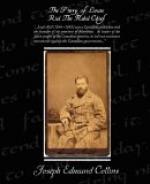GENERAL MIDDLETON was now called, and was examined by Mr. C. Robinson, Q.C. He testified that he was sent by the Minister of Militia to quell the outbreak on the Saskatchewan, and gave the well-known details of his encounter with the rebels at Fish Creek, and of his subsequent movement on Batoche. He testified to receiving two letters from Riel on the day of the capture of Batoche, in one of which Riel threatened to massacre the prisoners in his possession if he (Middleton) fired upon the half-breed women and children. The letter was produced in Court, and identified by the General.
CAPT. GEO. H. YOUNG, of the Winnipeg Field Battery, deposed that he was present at Batoche as Brigade Major under the last witness, and was in the charge at the close. Witness was first in the rebel council chamber after the capture of the village, and found and took possession of the rebel archives. A number of documents were produced, which witness recognised as those he had secured. After Riel’s surrender he was given into witness’s custody and taken to Regina.
MAJOR JARVIS, in command of the Winnipeg Field Battery during the campaign, and to whom the charge of the papers found at Batoche was confided, identified the papers produced in Court.
MAJOR CROZIER, of the N.-W. Mounted Police, was next sworn, and detailed the fact that he was met by an armed force of rebels at Duck Lake and fired upon, losing many of his command in killed and wounded. He testified that, subsequent to this engagement, a man named Sanderson brought him a letter from Riel asking him to come and remove his dead from the field.
CHARLES NOLIN was next called, and was examined by Mr. Casgrain in French. The deposition of this witness we take from the Toronto Globe. Nolin deposed that he lived in St. Laurent and formerly in Manitoba. He knew when Riel came to this country in July, 1884. And met him many times. Riel showed him a book he had written in which he said he would destroy England, and also Rome and the Pope. Riel spoke to him of his plans in December, expressing his wish for money, a sum between ten and fifteen thousand dollars. Riel had no plan to get it, but he wanted to claim an indemnity from the Dominion Government; that they owed him $100,000. Riel told him he had had an interview with Father Andre, and at that time he was at open war with the clergy, but had made peace with Father Andre in order to gain his ends. Riel went into the church with Father Andre and other priests, and promised to do nothing against them, and Father Andre had promised to use his influence with the Government to secure an indemnity of $35,000. This was in the beginning of December, 1884, the agreement being made at St. Laurent. Between December and February 14th, witness had taken part in seven meetings. Riel said if he could get the money from the Government he would go wherever the Government would send him—to the Province of Quebec or elsewhere. Otherwise, he said, before




